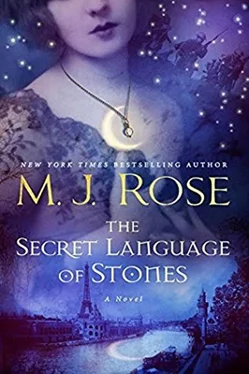I nodded; it was a favorite haunt of my great-grandmother’s as well, and I went there with her as often as we could. We’d always see mothers and children there, the little boys or girls absorbed in the heady drink, glistening brown with clouds of whipped cream floating on top.
“Until we realized he needed eyeglasses, he wasn’t a good student. But outfitted with the correct spectacles, he became an avid reader with at least three books open at once.” She smiled, remembering.
Under my dress, I felt the talisman warm against my skin. Was he here with me? Could he hear what his mother was saying?
“Jean Luc went to university in Oxford,” Madame Alouette continued, “and then stayed on in England to write a series of articles about castles for a magazine. His stepfather and I were so proud of him. When Jean Luc came home, he got a job with Le Figaro and started writing his art column. He loved it. His job gave him an excuse to spend days wandering through Montmartre, searching out artists, studying their work, trying to understand what drove them and our reactions to their work. He was so passionate and cared so much about art. About society rewarding an artist’s individuality, not condemning it. And then the war broke out.”
Even with all the information she’d fed me, I remained hungry for more. The skeleton of a description wasn’t enough for someone starving. She must have read something of my desperation, for suddenly she stood and said, “Would you like to see his room?”
I nodded, rose, and followed her back into the foyer and up a sweeping staircase. Down a hall, she opened a door at the far end on the right.
I smelled the scent as soon as I stepped inside. The same curious concoction accompanying Jean Luc’s visits. Exotic and pungent limes mixed with verbena with a hint of myrrh. At once a scent of the past and the present. An odd mixture of times and places.
If I imagined the visits, how would I have known about the scent? Unless Madame Alouette wore it that first time we met. Grieving her son, had she taken to wearing his cologne?
Breathing it in, I responded physically, stirred and excited by memories of the titillating nighttime magic Jean Luc’s ghost brought with him. Heat flushed my cheeks, and I hoped Madame Alouette didn’t notice.
“It’s very distinctive, isn’t it? A perfumer we use, just a few blocks from here, created it for him. Jean Luc never wore anything else.”
“L’Etoile’s?”
She nodded.
“I know that perfumer. He makes my grandmother’s scents too.”
One of Paris’s most prestigious firms, the House of L’Etoile dated back to before the Revolution and their shop on rue des Saints-Pères was just a few doors down from my family home.
If I went there, would they sell me a flacon of Jean Luc’s scent? Usually, once they created a bespoke perfume, no one else could purchase it. But what if the owner of the scent has passed on? Was it still protected? Or could I lie and say I’d come to pick up a bottle for him? Would they sell it to me then?
Madame Alouette turned on the light. Bookshelves, filled to overflowing, covered the walls. More books next to the bed, and another pile on the table next to an armchair.
Standing close to his desk, I glimpsed a sheaf of notes and an uncapped pen. An inkwell left open, the purplish ink dried out and flaking on the glass. He must have been in the midst of writing when he’d been called away. To the right, the typewriter still retained a sheet of paper in the carriage. Beside it, a small stack of paper covered with characters. On top of them, a pack of cigarettes and an ashtray, with a few inches of gray ash still inside it.
The covers on the bed were rumpled, and upon them, a book lay open, facedown.
Imagining that last afternoon, I pictured Jean Luc reading in bed, coming across an idea, rising, and going to the desk. He started typing, then stopped to think. Lit a cigarette. He’d smoked as he committed his thoughts to paper and then… what happened?
“I know I shouldn’t keep it like this in here. I should empty out his closet and give away his things but… I can’t…”
I nodded. Mothers spoke to me like this all the time. “When was Jean Luc last here?” I asked.
“Right before he…” She still couldn’t use the word. “He’d been home on leave. He and a friend were taking the train back that afternoon. Jean Luc was up here working when I called up to tell him Alain had arrived. Jean Luc came downstairs and I made both of them something to eat and then the time came for them to go. Jean Luc had already packed and left his luggage by the door. He must have forgotten about these unfinished notes and never come back up. The following day was Saturday, and my housekeeper doesn’t come on weekends. So no one straightened up the room. Marie fell ill and remained indisposed through Wednesday, when we got the telegram. When she finally returned on Thursday, I told her not to touch anything in here, but just to dust. Since then, that’s all she’s done. I can’t bring myself to straighten it up. If I leave it like this, I can pretend…”
“But pretending isn’t good,” I said. Talking to myself really.
“No. But it’s all we have.” Was she talking only to herself? Or was I included in the “we”?
Somewhere beyond the door I heard footsteps.
“Madame Alouette?”
The housekeeper, who I now knew as Marie, came to say she was needed in the kitchen. Excusing herself, Madame Alouette told me she’d be right back. Then she left me in Jean Luc’s room.
For the first few seconds, I didn’t move. Like a child staring into the window of a toy store, I just eyed the riches before me, overwhelmed with the gift I’d just been given.
“So this is where you lived?” I whispered as I strode over to the bed and stroked the depression his head had left in the pillow so long ago. I half expected it to be warm. But of course the linens were cool to the touch.
I imagined lying on the bed and fitting my body into the space where he’d lain. Would I feel his arms come around me? But I dared not muss Madame Alouette’s shrine. I touched the coverlet where his shoulders once had pressed down. Where his hips… his calves… his shoulders… left an imprint.
But like the pillow, all these spots were cold. Nothing of Jean Luc remained here anymore. The apartment had been his home, but he’d left it behind. The most his room could offer was insight into the man, what made him Jean Luc Forêt and not someone else.
I started with his bookshelves, seeking to learn what I could about him through his reading. I passed over the childhood classics we’d all read and concentrated on his adult tastes: experimental literature by the British, Americans, and French, as well as popular fiction. My finger ran along the spines of André Gide’s The Immoralist , Dubliners by James Joyce, The House of Mirth by Edith Wharton, Arthur Conan Doyle’s The Hound of the Baskervilles , and Marcel Proust’s Swann’s Way .
Among the shelves of art, architecture, and art criticism books, I recognized the authors Ruskin, Stendhal, and Clive Bell from conversations we’d had at home. Both my parents were highly critical of these critics.
From the condition of the spines of the books on the middle shelf, I guessed these were Jean Luc’s favorites, fiction and nonfiction all mixed together: Victor Hugo’s Hunchback of Notre Dame , Sigmund Freud’s Interpretation of Dreams , C. G. Jung’s Psychology of the Unconscious , D. H. Lawrence’s Sons and Lovers , and Phantom of the Opera by Gaston Leroux. Having recently finished Leroux’s gothic love story, I felt a thrill thinking of Jean Luc poring over the words and wondering when he’d read it-and what if we’d been reading it at the same time?
Читать дальше












